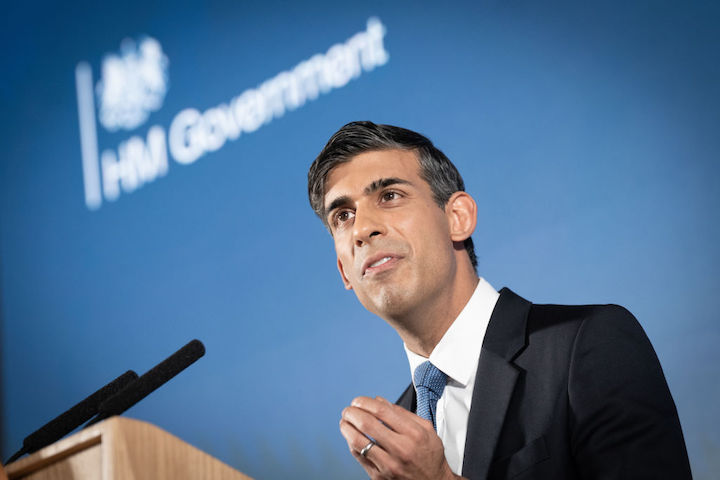After his five key pledges speech this week, one can only conclude that Rishi Sunak must have been shown the chart.
The chart in question crops up in a regular update that polling firm YouGov puts out on the key political issues, as seen by various segments of the electorate. It measures the priorities of those who voted Conservative in 2019 and therefore have it within their collective power – and potential inclination – to grant the party yet another term in office.
And it has told a consistent story for the past two years. The three biggest issues for voters – miles ahead of anything else – are the state of the economy, immigration and asylum, and healthcare.
Currently, 66 per cent of 2019 Tory voters list the economy as a top three issue, with 57 per cent mentioning migration and 46 per cent the NHS. The next most cited issue is crime, at 21 per cent.
So when Sunak says his five pledges – three of which concern the economy and one each the NHS and immigration – match ‘the people’s priorities’ he is bang on the money, at least when it comes to those voters the Tories can hope will turn out for them in 2024.
Sunak’s keynote speech this week – and indeed Keir Starmer’s – told us a lot about that looming contest. Most importantly, it looks set to be another Red Wall election. Hence Starmer’s pitch, which involved the idea of more political devolution to local communities, was sold under the 2016 Leave campaign slogan: ‘Take Back Control.’
Looking through Sunak’s pledges leads to the conclusion that he has decided to make it an immigration election, too. Because the first four – halving inflation, getting the economy growing, seeing public sector debt reducing (presumably as a proportion of GDP) and cutting NHS waiting lists – do not provide the Prime Minister with any meaningful dividing line with Labour.
This is certainly not the case with the final pledge: to stop the stream of Channel boats by passing a hardline new law guaranteeing the swift removal of those who arrive in the UK illegally. When Starmer was asked by a Daily Mail journalist in his post-speech Q&A what he would do to stop the boats, his answer was highly unconvincing.
He claimed, absurdly, that he would conjure up a dramatic improvement in law enforcement across Europe to ‘tackle the criminal gangs upstream’. The only other measure he specified was a drive to speed up asylum processing – which the Tories are already doing – and which will do nothing to reduce Channel crossings. It might even cause them to increase, given our current acceptance rate of asylum applications runs at more than 70 per cent.
This will not pass muster in a general election campaign. Especially not if Labour has been seemingly trying to block moves from a Tory administration which will, in Sunak’s words, be seen to ‘strain every sinew’ to stop illegal immigration.
Remember that in autumn 2019, the liberal left thought it had Boris Johnson cornered by preventing him from enacting his promise to get Britain out of the EU without further delay. But in the ensuing election, voters blamed left-wing parties for obstructing him – and handed him the mandate and the majority to get the job done. Sunak seems to be hoping he can capitalise on a similar tumult about a similarly emotive issue, and hence secure a similar result.
A third party leader also set out his stall this week. Yet again, Reform’s Richard Tice focused on becoming the standard bearer for Trussonomics (RIP) rather than seeking to take ownership of the much more potent force of migration scepticism. As the Telegraph’s Steven Edginton acerbically noted on Wednesday: ‘Reform UK launched a 2023 plan this morning. Immigration was featured on the third slide and was the 16th bullet point.’
This literal missing of the boat by Tice is potentially very helpful for Sunak. It gives him some breathing space to demonstrate that his administration will act where its predecessors failed to do so.
Given the Tory record on immigration matters, both legal and illegal, it will be a huge political challenge for the Prime Minister to convince Conservative-leaning voters that this time, the party really does intend to reduce volumes rather than increase them.
But the weaknesses of his competitors to the left and to the right gives him a potential pathway to success. Yes, the economy and the NHS will loom large, as they always do. But pledge number five is where the real political drama is to be found.







Comments